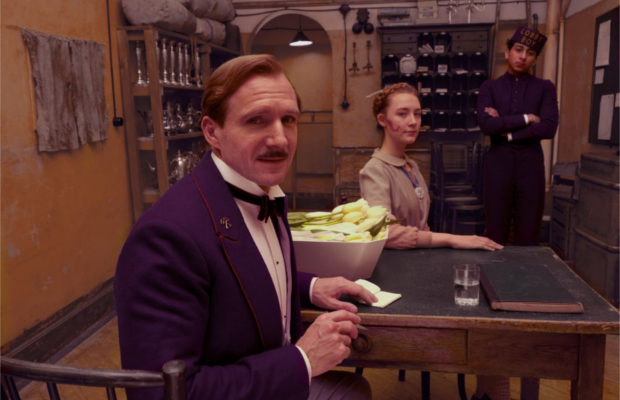Anderson’s Doll-House Noir Stuffed With Wisecracks and Woe
Placing us in the present, Anderson allows The Author (Tom Wilkinson) to set the stage for his tales of the Grand Budapest, speaking dryly to camera, while his children hilariously interrupt in whip pan and back. Forty years prior, The (much younger) Author (Jude Law) visited the secluded hotel nestled in the snowy mountains of the Republic of Zubrowka and found the once prestigious accommodations nearly vacant, rundown, yet still fondly revered by its owner and former lobby boy, Mr. Moustafa (F. Murray Abraham). An admirer of The Author’s work, Moustafa offers to divulge his mysterious history with the hotel over dinner, which takes us back another thirty years to 1932, the year the teenaged Moustafa (newcomer and future Anderson staple Tony Revolori), then nicknamed Zero, landed his devout Lobby Boy gig under the master of accommodations, M. Gustave (Ralph Fiennes in his most hysterically deadpan role to date). On the brink of war, Zubrowka is increasingly being occupied by the same military forces that murdered Zero’s family before he made his escape from foreign lands.
The grave aforementioned circumstances are almost always upstaged by Gustave’s disregard for the oncoming realities of his nation. His preoccupation with the hotel and its wealthy, over-the-hill clientele sends he and Zero on a riotous jaunt to claim his inheritance of one of the hotel’s most loyal visitors (Tilda Swinton caked in perfectly antiquing makeup), despite the murderous disdain of her spiteful spawn (Willem Dafoe, Adrien Brody) have for the wining and dining manther. Here, the film becomes a sort of doll-house noir, bathed in lavish pastels, shadowy figures and more fake blood than has dripped its way into Anderson’s work before, yet there’s an extended jailbreak sequence, an intertwined young romance and a secret society of hotel impresario and lobby boy duos the thicken the plot to a gloriously composed and somewhat gooey mess.
For many, The Grand Budapest Hotel will come off as too jumbled, overstuffed or emotionally imbalanced, overlooking several A-list actors with its insanely illustrious cast, butting ideas like the atrocities of war or the lasting pain of losing a loved one against whipsmart wisecracks and countless physical gags, all along jumping between a trio of time periods via different screen aspect ratios. But still, others might think this to be Anderson’s crowning achievement. Never before has he broached the painful subject of war, nor the enduring power of story or the tragedy of bearing one’s own painful memories, all of which he handles here with a precise poignancy that ever so subtly transcends time with agony via humor. It’s no coincidence that Gustave’s much lauded, inherited painting, ‘Boy With Apple’, holds the pivotal key to this wondrous murder mystery. In Anderson’s world, art is the bearer of all things.
